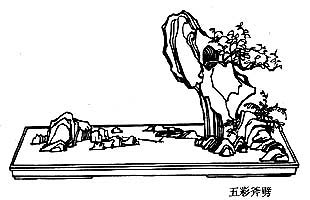Shi Jing 
 – Le Canon des Poèmes
– Le Canon des Poèmes
Le plus ancien recueil connu de poésie chinoise, plus de trois cents chansons, odes et hymnes. Tr. Legge (en) et Granet (fr, incomplète).
Shijing I. 8. (101)
High and large is the south hill,
And a male fox is on it, solitary and suspicious.
The way to Lu is easy and plain,
And the daughter of Qi went by it to her husband's.
Since she went to her husband's,
Why do you further think of her ?
The five kinds of dolichos shoes are [made] in pairs,
And the string-ends of a cap are made to match ;
The way to Lu is easy and plain,
And the daughter of Qi travelled it.
Since she travelled it,
Why do you still follow her ?
How do we proceed in planting hemp ?
The acres must be dressed lengthwise and crosswise.
How do we proceed in taking a wife ?
Announcement must first be made to our parents.
Since such announcement was made,
Why do you still indulge her desires ?
How do we proceed in splitting firewood ?
Without an axe it cannot be done.
How do we proceed in taking a wife ?
Without a go-between it cannot be done.
Since this was done,
Why do you still allow her to go to this extreme ?
Legge 101

Le Canon des Poèmes – Shi Jing I. 8. (101) – Chinois off/on – Français/English
Alias Shijing, Shi Jing, Book of Odes, Book of Songs, Classic of Odes, Classic of
Poetry, Livre des Odes, Canon des Poèmes.
Le Canon des Poèmes, Les Entretiens, La Grande Étude, Le Juste Milieu, Les Trois Caractères, Le Livre des Mutations, De la Voie et la Vertu, 300 poèmes Tang, L'Art de la guerre, Trente-six stratagèmes
Bienvenue, aide, notes, introduction, table.
Index – Contact – Haut de page
